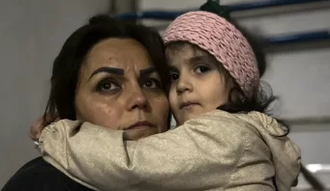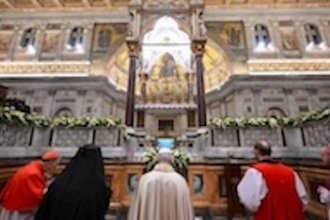Call for prayers as ethnic Armenians flee Nagorno Karabakh

Image: Hozana
Source: Vatican News/Hozana
Nearly three thousand ethnic Armenians have so far fled Nagorno Karabakh following last week's Azerbaijani military takeover.
According to a statement from the Armenian government, published this morning, more than 2,900 refugees have arrived in Armenia from the enclave in the South Caucusus region. Observers say many more people are likely to travel to Armenia.
David Babayan, an official in the region's ethnic Armenian government, has told Reuters news agency that he expects almost all of Karabakh's 120,000 ethnic Armenians to leave.
They "do not want to live as part of Azerbaijan," he said. "99.9% prefer to leave our historic lands ... The fate of our poor people will go down in history as a disgrace and a shame for the Armenian people and for the whole civilised world."
Nagorno Karabakh is internationally recognized as part of Azerbaijan, but has been governed by ethnic Armenians since the collapse of the Soviet Union. Azerbaijan says that it wants to re-integrate the Armenians now within its border as "equal citizens."
Armenia, however, has raised fears of human rights abuses and ethnic cleansing, pointing out that Azerbaijan has refused international oversight of the reintegration process, and failed to provide details on how it would be achieved.
The Armenian government has promised to accommodate all refugees from the enclave, saying it will "lovingly welcome our brothers and sisters."
Over the centuries, Nagorno Karabakh has been ruled by Persians, Turks, Russians, Ottomans and the Soviet Union. After the collapse of the last of these, it declared independence.
The enclave lies in a region - the South Caucasus - criss-crossed by gas pipelines, and is a centre of tensions between Russia, Iran, Turkey and the United States.
The Armenian Prime Minister has accused Russia - which has 2,000 peacekeepers stationed in the region - of failing to protect Nagorno Karabakh, an accusation Russia has rejected.
Turkish Prime Minister Recep Erdogan, a key ally of Azerbaijan, is due to meet Monday with Azerbaijani President Ilham Aliyev.
The EU, meanwhile, has announced that it will host talks with representatives from Armenia, Azerbaijan, France, and Germany.
Around the year 300 AD, Armenia became the first country in the world to officially adopt Christianity.
Both the European Parliament and UNESCO, the United Nations cultural agency, have raised concerns over the destruction of historic Christian sites in the enclave.
In an interview with the BBC in 2020, Azerbaijani President Ilham Aliyev denied that there is any cause for concern, suggesting that churches had been targeted accidentally.
Pope Francis visited Armenia in 2016. Earlier this year, he sent Cardinal Pietro Parolin, the Vatican's Secretary of State, to the region to meet with both Armenian and Azerbaijani officials concerning the situation in Nagorno Karabakh.
The Armenian Catholic Eparchy of Our Lady of Nareg, led by Bishop Mikael Mouradian, have launched a Novena, hosted by Hozana.org for the total deliverance of the Armenian people in this troubled region. For more information and to join, see:
https://hozana.org/en/community/11688-novena-for-the-deliverance-of-the-armenian-people
See also Lord Alton's latest blog on the situation in Armenia: www.davidalton.net/2023/09/25/disturbing-report-from-the-armenian-authorities-about-what-is-happening-in-nagorno-karabakh-and-the-further-dangers-faced-by-armenians/


















